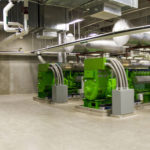


From: MIBiz.com
By Elijah Brumback
FREMONT — Rather than get sent to rot in a landfill, about 100,000 tons of food processing waste will be converted into electricity once Michigan’s first large-scale biodigester comes online this summer.
Construction on the $22 million Fremont Community Digester and electric generator is just now wrapping up, and testing at the facility should begin in a matter of months.
The project’s developer, NOVI Energy, also signed a $55 million agreement with Consumers Energy to purchase approximately 380,000 megawatt-hours or 19,000 MWh per year of electricity from the plant over the next 20 years. The deal marks the first time the utility will buy energy made from food processing waste.
Anand Gangadharan, president and CEO of NOVI Energy, a Southeast Michigan-based energy consultant company, said the company took a little over 10 years to search out the best technology and finally found it Denmark and Sweden. The company then entered a licensing agreement with the technology providers and brought the process to Michigan, he said.
Using food and other organic waste, the digester breaks down the material into two products: nutrient concentrate, which can then be sold as agricultural fertilizer, and methane gas for energy production.
Contracts with local food processing companies, including Gerber Products Co. and the Fremont Cooperative Produce Company, will maintain the supply of organic waste. As and added benefit, the waste suppliers will also be able to hurdle the waste limits imposed on them by the Michigan Department of Environmental Quality.
The facility expects to process between 300 and 400 tons of waste a day to maintain an output of 3 megawatts of power. Gangadharan said the facility would process 100,000 tons of waste a year, a significant impact on the amount of organic waste going to local landfills. He said because of Michigan’s tremendous agriculture base, the setting is very ripe — no pun intended — for the technology to secure itself a place in the state’s energy portfolio.
“A portfolio approach to energy is essential,” he said. “Power from digesters and digester gas should be a tool in the arsenal.”
The state of Michigan considers energy created from biomass a form of renewable energy.
While Gangadharan sees plenty of opportunity for more digesters in the state, he admits the reality of solving long-term energy problems will take a blended approach. The broader the range of a portfolio, the better it is and the less risk there is, he said.
“Encouragement from utilities and governmental institutions is just catching up,” he said. “This project happened primarily because of the renewable portfolio standard in Michigan.”
Last summer Consumers Energy inked a $55 million contract with NOVI Energy to purchase the power supplied from the digester over the next 20 years.
The agreement helps Consumers Energy fulfill its RPS mandate that 10 percent of its electricity come from renewable sources by 2015. However, at 3 megawatts, the plant is but a small piece of the utility’s broader energy portfolio, said spokesman Dan Bishop. Consumers is halfway toward meeting its RPS target with 5 percent of its electricity coming from renewable sources.
“It’s not really going to raise our portfolio, but smallness is secondary to innovative quality,” Bishop said. “This partnership is a demonstration of a collaborative effort to make something like this possible.”
While the construction of wind turbines has dominated a greater portion of the discussion on alternative energy, Gangadharan said operation of the Fremont digester is encouraging for other like projects going forward.
Gangadharan said NOVI has already identified other opportunities and is waiting on other potential commitments from partners.
NOVI Energy contact:
Aditya Gangadharan, 248.735.NOVI (6684) x 127, adganga@novienergy.com
